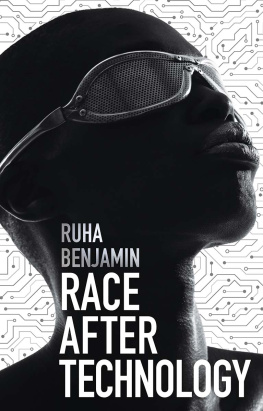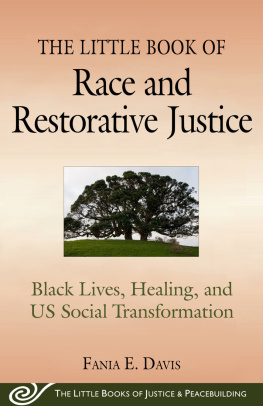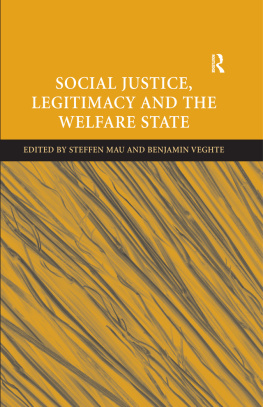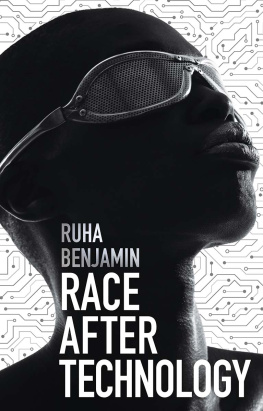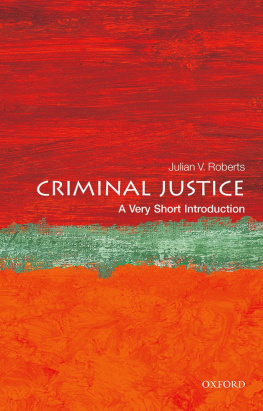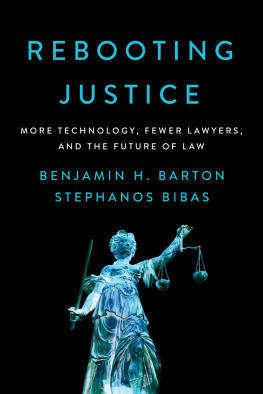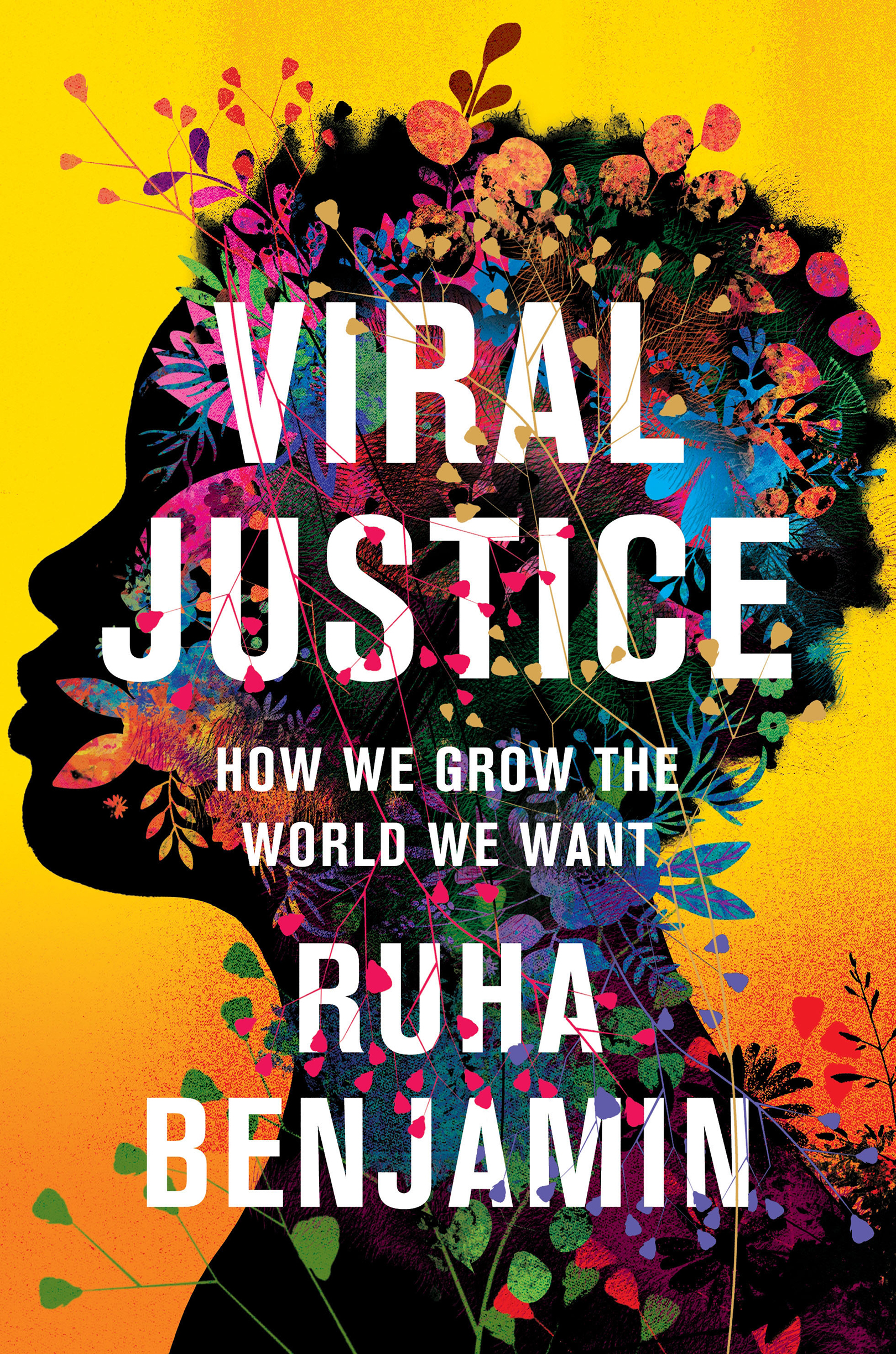VIRAL JUSTICE
VIRAL JUSTICE
HOW WE GROW THE WORLD WE WANT
RUHA BENJAMIN
PRINCETON UNIVERSITY PRESS
PRINCETON AND OXFORD
Copyright 2022 by Ruha Benjamin
Princeton University Press is committed to the protection of copyright and the intellectual property our authors entrust to us. Copyright promotes the progress and integrity of knowledge. Thank you for supporting free speech and the global exchange of ideas by purchasing an authorized edition of this book. If you wish to reproduce or distribute any part of it in any form, please obtain permission.
Requests for permission to reproduce material from this work should be sent to permissions@press.princeton.edu
Published by Princeton University Press
41 William Street, Princeton, New Jersey 08540
99 Banbury Road, Oxford OX2 6JX
press.princeton.edu
All Rights Reserved
Library of Congress Control Number: 2022932477
ISBN 9780691222882
ISBN (e-book) 9780691222899
Version 1.0
British Library Cataloging-in-Publication Data is available
Editorial: Meagan Levinson, Jacqueline Delaney
Jacket Design: Henry Sene Yee
Production: Erin Suydam
Publicity: Maria Whelan, Kate Farquhar-Thomson
Copyeditor: Ashley Moore
Jacket Credit: Cyndi Shattuck
CONTENTS
- ix
- I want to grow up and so should you
- Bodies tell stories that people will not tell
- Where life is precious, life is precious
- What are we pretending not to know today?
- You are not a machine, stop grinding
- Your baby is beautiful and so are you
- We want to be at the table, not on the table
- Be willing to be transformed in the service of the work
All that you touch
You Change.
All that you Change
Changes you.
OCTAVIA E. BUTLER
AUTHORS NOTE
In order to maintain the flow of the text, I have opted to use keywords instead of superscript numeric callouts for the endnotes. To look up reference material, refer to the notes section at the back of the book or use the last three words of the sentence to digitally access a note.
Many of the endnotes expand on the topic in question from the main text. Other notes contain source material for further research if you choose to pursue the topic.
(Funtunfunefu Denkyemfunefu), which mark new sections within each chapter, are one of the Adinkra symbols that represent concepts and aphorisms, originally created by the Gyaaman people of the Bono region (Ghana and Ivory Coast): The Siamese crocodiles share one stomach, yet they fight over food. Like a chorus repeating throughout the text, they remind us of our interconnectedness and our foolishness as human beings.
VIRAL JUSTICE
INTRODUCTION
The White House
I grew up in the White House. At least thats what the gold-plated sign hanging on the front door announced. In the 1950s, my grandparents bought a two-story Craftsman house just off Crenshaw Boulevard in Los Angeles. They were children of the Great Migration, the era between 1915 and 1970 when millions of African Americans left the Jim Crow South to search for better futures in the northern and western United States. They sprang from Arkansas and Texas by way of Georgia, then made their way west, first to Watts, and eventually to the Leimert Park area, a little corner of the city where they finally put down roots. These acts of flight would later be recognized as a general strikefugitives escaping the newfangled forms of servitude that evolved .
They raised my father and my four aunts in that Craftsman on Fourth Avenue. By the early 80s, I also found refuge in the White House along with my parents and brother, Jamal. Although this was the side of LA where even the palm trees looked exhausted, in my mind, the entire world revolved around our block: school bells ringing, police helicopters circling, music vibrating from the apartments next door, and my grandma holding court in the kitchen.
Grandma, perched on a tall chair within arms length of her mustard-yellow rotary phone, seemed to be always on call. As a former social worker and the retired director of the South Central office of the County of Los Angeles Department of Adoptions, Grandmas bible was a large calendar book inked with meticulous notes and reminders about church weddings and family counseling.
The book was always sprawled open on the counter, beside her daily pillbox stuffed with colorful contents that never ran out: blue to offset the side effects of the green, and to counteract the symptoms of the yellow. Grandmas voice was the center of our recordsteady, soothing, never raised as she reminded us, This, too, shall pass. The only good reason to venture out was to play tag with kids on the block or buy sunflower seeds and Now and Later candy at the corner store a couple of blocks east on Second Avenue. Everything else I could ever want was within reach.
The White House must have been the center of the universe, I thought, since even my public elementary school stood across the street, at the far end of the block. Inexplicably, my dad would make us walk back to the corner closest to the house to cross the street, then walk in the direction of Angeles Mesa Elementary, passing the White House from across the street. We were deep in the hood, but no jaywalking. Day after day, first backward, then forward.
This is when I learned to roll my eyes so no one could see. It is also where my abiding admiration of rule breakers was seeded, especially when the rules seemed arbitrary and controlling. Of course now, as a parent, I get it. Dads rules were an invisible web meant to protect, not entrap, so that when he wasnt there to watch us cross, the light at the corner could watch over us instead.
The playground was where I let loose. I was a beast at kickball, tetherball, and handball. Or so I imagined. One day, as I rounded the kickball field, one of the boys I liked on the other team was blocking my access to second base, so I pushed him to the ground and kept running. This landed me in the principals office, a truly foreign experience that I approached as an alien might, detached but interested, observing some strange rite of punishment. Stranger still, it seemed to be happening to someone who looked exactly like me but wasnt me. With my parents at work, my grandma was the one to pick me up. Driving the short distance home in her gold Chrysler, there was no disappointed speech, no grounding, no punishment. Clearly, from her point of view, whoever had branded me with this suspension was not in possession of all the facts.
Sure, suspension was designed to teach me a lesson, and it worked. It just didnt teach me the one they intended. In the world my grandmother had built, suspension meant time to decompress, space to reflect, a chance to bond, and most importantly, plentiful access to my favorite snacks.
Grandma White, it turns out, was an undercover abolitionist, replacing castigation with care, suspension with connection, shame with encouragement. Rather than making me feel small and bad, she showered me with tenderness, making me want to do better. It was what she didnt say, what she chose not to shine a light on, that imprinted on me with such force. Rather than parrot the schools reprimand, she chose a different poetics, one guided by the credo that


